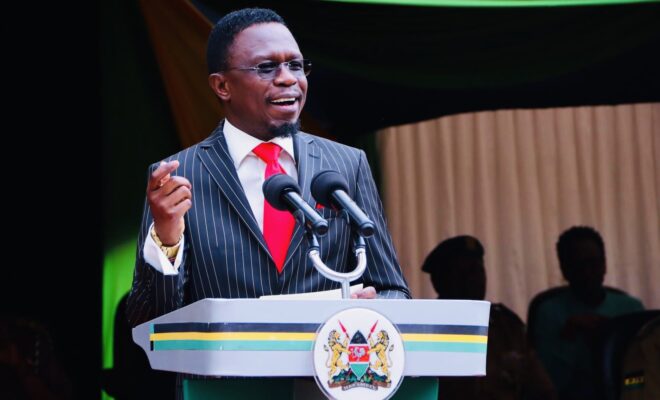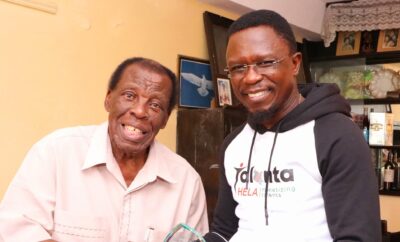
Entertainment
KENYAN ARTISTES ISSUE DEMANDS TO CS ABABU NAMWAMBA
By |
Kenyan musician held a press conference on November 8 to champion the betterment of the creative industry. Organised by gospel musician Rufftone, the musicians called upon the newly elected CS, Hon. Ababu Namwamba to transform the creative industry. Among the things they want addressed include:
Anti-Piracy: Fast-tracking of the mandatory continuous Blocking of Copyright-infringing Domains, and Re-direction to Legitimate Websites, by ALL Internet Service Providers (ISPs) – as per Section 35 in the Copyright Act, will:
- Unlock KES 92 billion per Year (or KES 252 million per Day) from illegitimate Websites into the legitimate Business of the Creative Industry.
- Directly create over 50,000 professional Jobs for Youth – which shall Support their Families and Communities.
- Attract local and international Investment to the Creative Industry, as our Creatives become economically Empowered to Create more quality Content, which can Compete with Nigeria and South Africa on a Global stage.
- Raise KES 17.38 billion in Value Added Tax, Corporation Tax and Income Tax from the Creative Industry every Year.
- Keep our Families & Communities in Kenya safer, since the Perpetrators of this Cybercrime are also Organised Criminals involved the Trafficking of Weapons, Drugs, Humans, Organs, etc.
International Alignment of Tariffs for Broadcasters to be Gazetted by the Kenya Copyright Board (KECOBO):
- Tariffs for Broadcasters in Kenya are currently a Flat Rate, which defies the global Principle of Royalties linking the Success of Audio-Visual Works to the Revenue they Deliver.
- As such, KECOBO should be Directed to Gazette a License Fee of 11% Monthly Revenue (i.e. this Data can be Captured from VAT Returns on iTax) for Broadcasters, which shall align Kenya to International Best Practice.
- PwC’s Entertainment & Media Outlook for Kenya: 2019-2023, reported Advertising on Radio & Television in Kenya during 2018 to be worth $191 million (KES 19.1 billion). Advertisers don’t Spend on Radio & Television, unless they have an Audience. This Audience is Attracted by Audio-Visual Works.
- A 11% Royalty on these Earnings would Yield KES 2.10 billion per Year as Income for Songwriters, Composers, Publishers, Executive Producers, Musicians, Actors and Dancers.
- And all it Requires is for Broadcasters to Increase their Advertising Rate Cards by 11%, which they do normally, thus Passing the Royalty Cost to the Advertiser, which won’t Increase the Cost of Goods & Services to the Consumer.
- Yet, KES 2.10 billion per Year into the Creative Industry can Create over 2,500 Jobs for Youths, directly and indirectly; plus deliver about KES 0.5 billion in Income Tax.
Local Music Content:
- Direct the immediate Implementation of a Minimum Rate of Seventy-five Percent (75%) Local MUSIC Content (i.e. not just Local Content) during Prime Time; because Music is delivered Free to Broadcasters, as Songs on Radio and within Television Programmes (i.e. Production Music), in addition to Music Videos. That is, the Broadcasters don’t need to Produce such Content or Pay for it in Advance; only Pay the Royalties after Use, when programming Music.
- Furthermore, the Advertising Industry should be Directed to have a Minimum Rate of Seventy-five Percent (75%) Local MUSIC Content within Radio, Television & Online Video commercials (e.g. Jingles, Signature Tunes, Production Music, etc), via Synchronisation, instead of the Licensing of Foreign Music. This shall Deliver more Revenue to Songwriters, Composers, Publishers, Executive Producers and Performers in Kenya. This just requires the Enforcement of the current Broadcast Regulations on Local Content in Advertising.
- Also, Government, Corporates & Non-Governmental Organisations should be Directed to Ensure that where their Marketing and/or Sponsorship Budget includes Music, that a Minimum of Seventy-five Percent (75%) of that Budget is Allocated to Local Content. We’ve seen too many Concerts in Kenya, for example, where the Majority of the Talent Budget goes to Paying an Artist from Tanzania, Nigeria, Jamaica, America, etc, while the Local Musicians, of equal Skill and Popularity, are to Share whatever is Remaining. This is Inequitable and doesn’t Grow our Creative Industry.









0 comments